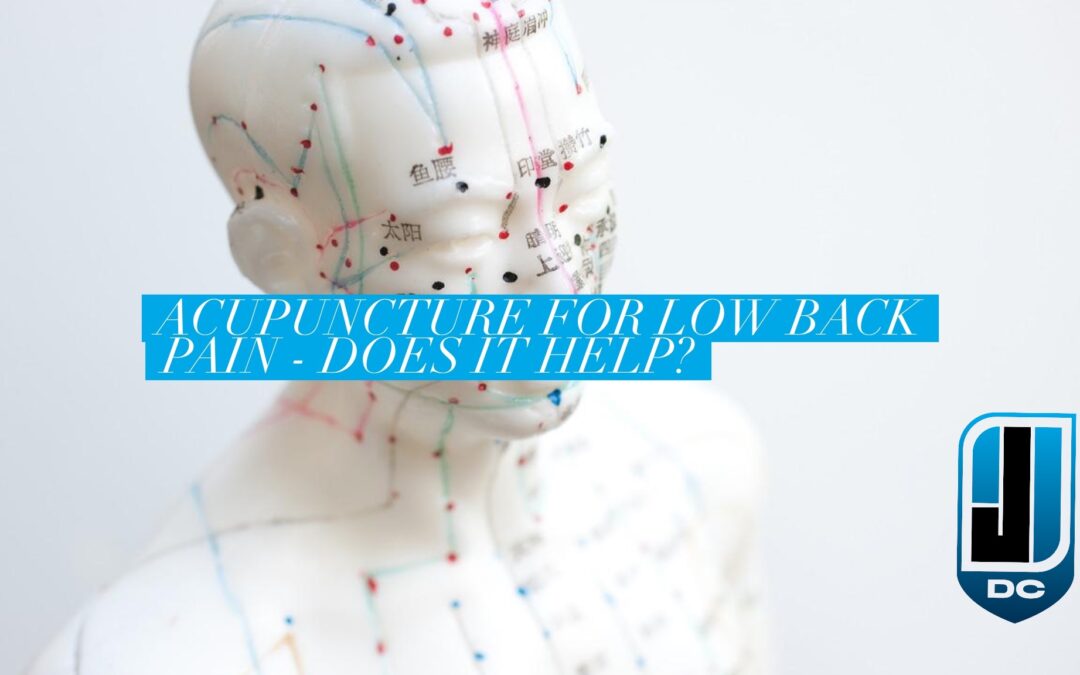If you’re suffering with low back pain and have tried all the usual treatments, it might be time to consider some alternative treatments. Acupuncture for low back pain is one of the most common alternative treatments used to relieve pain and improve movement.
Low back pain is one of the most common conditions in the US, and the leading cause of disability in the world according to the American Chiropractic Association. It’s estimated that 80% of people will have back pain, and in 10% of them it may turn into a chronic condition. Unfortunately, we’ve generally failed at preventing low back pain and treating it effectively. This has encouraged the use of alternative medicine, like acupuncture, to treat it since conventional treatments often fail.
If you have low back pain you’ve probably tried the typical home treatments such as OTC pain relievers like Tylenol or Ibuprofen, heat, ice, and stretching. When those don’t work, 84% of people with low back pain will seek medical care. Usual medical care for low back pain includes prescription medications and sometimes injections. Chiropractors and PTs can help address the underlying cause but these treatments take your participation and consistency.
So, what about acupuncture? Some people swear by it, but does it work for low back pain? In this post I’ll answer that question plus a few other questions surrounding acupuncture for low back pain. Here’s what I’m going to cover:
Can acupuncture help low back pain?
- Can it help acute low back pain?
- Is it good for chronic low back pain?
- Does acupuncture for low back pain last?
- Is acupuncture safe?
- Is acupuncture cost effective?
Does health insurance cover acupuncture?
What type of doctor performs acupuncture?
Is acupuncture of chiropractic better for low back pain?
Can Acupuncture Help Low Back Pain?
Acupuncture can help low back pain and it is a safe alternative treatment for low back pain. There have been numerous studies that have shown the benefits of acupuncture for low back pain, you don’t simply have to take my word for it. Here are just a few points I’ve taken from available studies about the effectiveness and cost of the treatment for low back pain:
The Effectiveness of Acupuncture for Acute Low Back Pain
The current evidence is encouraging in that acupuncture may be more effective than medication for symptom improvement or relieve pain better than sham acupuncture in acute LBP.
Lee JH, Choi TY, Lee MS, Lee H, Shin BC, Lee H. Acupuncture for acute low back pain: a systematic review. Clin J Pain. 2013;29(2):172-185. doi:10.1097/AJP.0b013e31824909f9
The Effectiveness of Acupuncture for Chronic Pain
Acupuncture is effective for chronic pain, including low back pain11: In patient-level meta-analyses of randomized controlled trials that included ∼18,000–21,000 patients with chronic musculoskeletal pain, acupuncture was found to be substantially better than standard care and significantly better than sham acupuncture. Approximately 20% of the population included in these trials are aged 65 years or older.
Mao JJ, Davis RT, Coeytaux R, et al. Acupuncture for Chronic Low Back Pain: Recommendations to Medicare/Medicaid from the Society for Acupuncture Research. J Altern Complement Med. 2019;25(4):367-369. doi:10.1089/acm.2019.29067.jjm
The Benefits of Acupuncture Seem to Last
The effects of a course of acupuncture treatment for patients with chronic pain do not appear to decrease importantly over 12 months.
MacPherson H, Vertosick EA, Foster NE, et al. The persistence of the effects of acupuncture after a course of treatment: a meta-analysis of patients with chronic pain. Pain. 2017;158(5):784-793. doi:10.1097/j.pain.0000000000000747
Acupuncture is Safe
The risk of serious events occurring in association with acupuncture is very low, below that of many common medical treatments.
White A. A cumulative review of the range and incidence of significant adverse events associated with acupuncture. Acupunct Med. 2004;22(3):122-133. doi:10.1136/aim.22.3.122
Acupuncture is a Cost Effective Treatment
Acupuncture plus routine care was associated with marked clinical improvements in these patients and was relatively cost-effective.
Acupuncture care for low back pain seems to be cost effective in the longer term.
Witt CM, Jena S, Selim D, et al. Pragmatic randomized trial evaluating the clinical and economic effectiveness of acupuncture for chronic low back pain. Am J Epidemiol. 2006;164(5):487-496. doi:10.1093/aje/kwj224
Ratcliffe J, Thomas KJ, MacPherson H, Brazier J. A randomised controlled trial of acupuncture care for persistent low back pain: cost effectiveness analysis. BMJ. 2006;333(7569):626. doi:10.1136/bmj.38932.806134.7C
Does Health Insurance Cover Acupuncture for Low Back Pain?
Yes, most private health insurance plans do cover acupuncture for low back pain. However, not all of them and the plan may have specific criteria. The best way to find out if you have coverage is to take a look at your insurance plan. If you’re not sure how to check, you can also call a doctor’s office and ask them to check your insurance for acupuncture benefits.
Like other treatments, you may have a copay for acupuncture treatments or a deductible to meet before your insurance will pay for your visits. In contrast, dry needling is almost universally not covered by insurance.
Medicare is a unique example of acupuncture coverage. Although they cover acupuncture for low back pain they require a referral from a medical doctor to a licensed acupuncturist only or another medical doctor who practices acupuncture.
What Type of Doctor Performs Acupuncture?
Acupuncture is widely practiced by Doctors of Chinese Medicine licensed in Acupuncture. There are other doctors that treat low back pain with acupuncture though. In most states chiropractors can treat low back pain with acupuncture, which is great since they’re familiar with treating low back pain on a daily basis. Medical doctors and Doctors of Osteopathy can also practice acupuncture, although it’s not as common to find one that does.
At Sentara Therapy Center I offer acupuncture in Dumfries, VA. I also offer chiropractic care, personalized in-office and at home rehab, dry needling, and other treatments for low back pain and conditions of the spine. If you have an injury of condition that’s not spine-related, acupuncture and chiropractic care is an excellent choice for those as well.
Is Acupuncture or Chiropractic Better for Low Back Pain?
Acupuncture and chiropractic adjustments can both relieve pain, improve movement, and improve quality of life in patients with low back pain. As a chiropractor, there are a few scenarios where I’ll use acupuncture instead of chiropractic adjustments:
- The patient has tried chiropractic adjustments before and they haven’t helped reduce their pain and improve their movement.
- Patient preference – the patient prefers to try acupuncture first.
- Joint instability makes acupuncture a more appropriate treatment than chiropractic adjustments.
- A patient’s specific cause of back pain is primarily more muscular or from a peripheral nerve origin.
- Movement is extremely restricted and the patient is more comfortable laying still.
- The patient’s case of back pain is chronic and there are underlying aspects that complicate the patient’s presentation.
In saying this, there are also many instances where I use both chiropractic adjustments and acupuncture at the same visit. They both have value for treating low back pain, and when combined, can produce some awesome results.
In summary, research into acupuncture and chiropractic adjustments for low back pain relief is fairly substantial. Both treatments can help, but the right treatment should be based on the patient’s individual cause of low back pain and the doctor’s intuition on what’s more beneficial.

Jason Williams DC is a licensed Doctor of Chiropractic with Physical Therapy Modality and Acupuncture privileges. He is a chiropractor in Dumfries, VA at Sentara Therapy Center. Dr. Williams’ clinical expertise is in the evaluation, treatment, and rehabilitation of neuro-musculoskeletal conditions. Specific focuses include spinal, extremity, and sports-related complaints. He brings a patient-first attitude to his treatments and is a proponent of evidence-based and integrative care. See more content and his contact info here.
The opinions and views are mine personally, and do not necessarily reflect the views of others in the profession, my employer, or organizations that I belong to.

